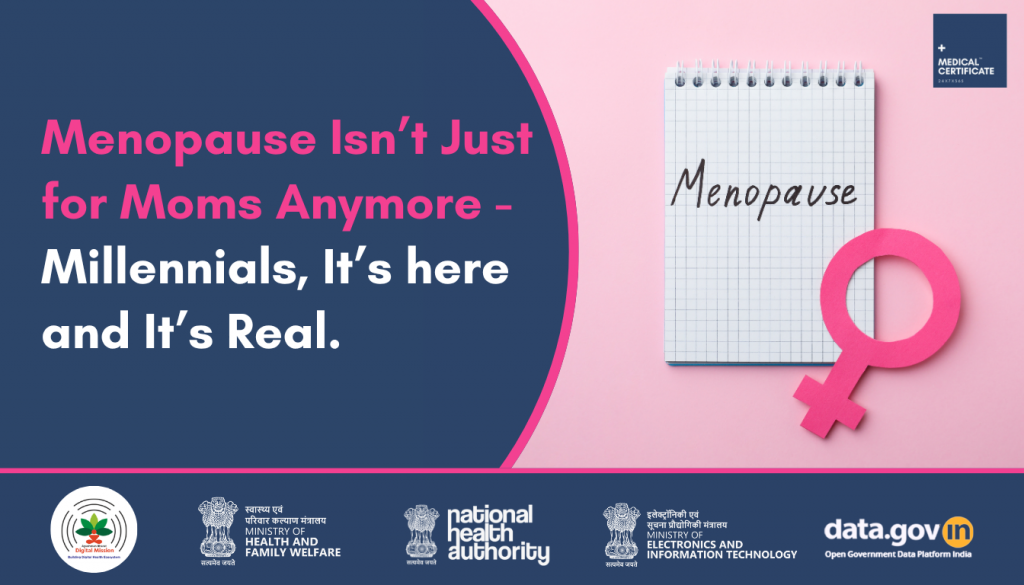Rethinking the Age of Menopause
When you hear the word menopause, what image comes to mind?
For most, it’s likely a woman in her late 40s or early 50s quietly referring to “the change.” But a surprising new generation is entering the conversation—millennials.
Yes, the same generation that grew up with the internet, drives digital culture, and champions mental health awareness is now facing a topic society rarely associates with them: early or premature menopause. This isn’t just a rare anomaly—it’s a growing reality, and it deserves our attention.
Understanding Menopause: More Than Just an Age
Medically, menopause is diagnosed when a woman has gone 12 consecutive months without menstruation. It signals the end of ovulation and a sharp decline in estrogen production by the ovaries.
While the average age of menopause is around 51, it can occur earlier due to various factors. Menopause before the age of 40 is termed premature menopause or primary ovarian insufficiency (POI). When it happens between ages 40 and 45, it’s referred to as early menopause.
Why Millennials Are Experiencing Menopause Earlier
Millennials—those born between 1981 and 1996—are currently in their late 20s to early 40s. While many aren’t expecting to face menopause for at least a decade, a growing number are showing signs of perimenopause or experiencing early menopause.
Several factors may be contributing to this shift:
Autoimmune and Genetic Conditions – Diseases like lupus, thyroid dysfunction, and inherited conditions such as Turner Syndrome or Fragile X can impact ovarian function.
Medical Treatments – Surgeries like hysterectomy, or treatments such as chemotherapy and radiation, can accelerate ovarian failure and trigger menopause prematurely.
Environmental Toxins and Chronic Stress – Exposure to endocrine-disrupting chemicals found in plastics, cosmetics, and pesticides, combined with the chronic stress of modern life, may be speeding up hormonal decline.
Lifestyle Factors- Smoking, restrictive diets, overtraining, and a history of eating disorders are all linked to earlier menopause onset.
A study in Human Reproduction (2020) found that up to 1% of women under 40 may experience premature menopause, and nearly 5% of women experience it before age 45.
Why Early Menopause Matters—More Than You Think
Early menopause isn’t just about fertility loss. The hormonal shifts that accompany it impact every part of the body, from mood to metabolism.
Many millennial women experiencing early menopause report symptoms such as:
- Irregular or missed periods
- Mood swings, anxiety, or depression
- Hot flashes and night sweats
- Brain fog and difficulty concentrating
- Low libido or vaginal dryness
- Fatigue and joint aches
- Insomnia or disrupted sleep
Often, these women dismiss their symptoms as stress-related or feel too young to suspect menopause, leading to misdiagnosis or lack of support.
The Emotional Toll of Unexpected Change
Discovering you’re going through menopause at 32 or 37 can feel like an emotional earthquake—especially if you’re planning to start a family later.
The experience can bring with it a wave of grief, identity confusion, and even shame. You might feel out of place among peers, misunderstood by healthcare providers, or isolated in your struggle.
Some common emotional responses include:
- Grieving lost fertility
- Fear of aging “too early”
- Strain in intimate relationships
- A shift in self-image and identity
Because menopause is still treated as something that “only older women face,” younger women often suffer in silence, feeling unsupported or dismissed.
Why We Need to Talk About Menopause—At Every Age
It’s time to stop treating menopause as an “old woman’s” issue. Menopause is a natural biological transition that can happen at any reproductive age and affects physical health, emotional wellbeing, and life choices.
To better support millennial women navigating early menopause, key changes are needed:
Better Awareness in Healthcare- Doctors often overlook menopause in younger women. More training is needed to help them recognize hormonal symptoms and recommend appropriate support.
Workplace Inclusion and Sensitivity – Just as menstruation and maternity leave are beginning to be discussed in professional spaces, menopause—regardless of age—deserves acknowledgment and empathy. Fatigue, anxiety, and sleep issues can impact productivity, but with the right support, women can continue to thrive.
Integrated Support Services- Hormonal shifts affect mental health significantly. It’s important that emotional wellness and reproductive care go hand in hand, so women aren’t misdiagnosed with depression or anxiety when hormones are at play.
Access to Fertility Counseling – For those who still want children, information about options like egg freezing, donor eggs, or surrogacy should be made available early and openly.
What Millennials Can Do to Protect Their Health
If you’re a millennial noticing changes in your cycle, energy levels, or mood that don’t feel “normal,” listen to your body. These could be hormonal shifts—not just stress.
Start tracking your monthly symptoms, including your period, mood, sleep, and focus levels. Ask your doctor about hormone tests like FSH, AMH, and estrogen levels. If your symptoms are dismissed, don’t hesitate to seek a second opinion.
You can also explore holistic care practices such as nutrition, acupuncture, yoga, or integrative medicine approaches, alongside medical support.
Rewriting the Narrative, Together
Millennials are redefining so many societal conversations—from mental health to body positivity to career choices. It’s time we add menopause to the list.
Early menopause is real. It’s not rare. And it’s about far more than just reproduction. It touches identity, relationships, emotional wellbeing, and quality of life.
The more we talk about it, the more women will feel seen, supported, and empowered to seek help early. If you or someone you love is going through this, know that silence isn’t strength—awareness is.
You are not alone.
You are not broken.
You are evolving—and your story matters.

